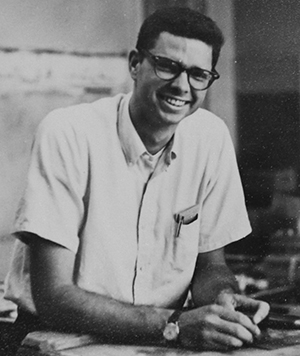Ernst Ophuls
At this year's gala, we will present the annual Ernst Ophuls Award. Many Lay Mission-Helpers have heard his name but perhaps know little of his story. But what a story it is, and we are very excited to share it with you.
Ernst Ophuls, born in San Francisco, California, was a member of the sixth group of Lay Mission-Helpers to be trained and sent into the mission fields for a three year assignment. He attended the California Institute of Technology, Williams College and Gonzaga University, earning degrees in art, physics and philosophy. He also was an expert aviation mechanic and small craft pilot. His assignment in Ecuador was to bridge the forbidding mountains and backcountry, transporting missionaries and freight by aircraft to and from the mission sites. In June of 1962, while in Macas, located east of the Andes Mountains, Ernst ate a contaminated piece of meat. He immediately became seriously ill and was flown to Quito where he received treatment. However, he succumbed to the illness and died on June 22, 1962 at age 26. His chaplain later wrote, “Ernie died praying, with full consciousness, with a smile on his lips.”
Quotes by and about Ernie Ophuls
Ernie on Spirituality:
“It would be a pleasure to have a job directly concerned with helping others. Helping the Church in Her mission work is a most worthy end in itself and a means of drawing nearer to Christ.”
“I find that when I get spiritually pooped, it is because I haven’t been keeping my bargain with God, neglecting meditation, spiritual readings and the Rosary. But as soon as I consult the little yellow book and climb back on, He restores all graces, Deo Gratias.”
His Christmas wish in December 1961 contained a quote by G. K. Chesterton, “Of the birth of Christ he wrote that He who created the world now had hands too small to span the head of the ox that stood near Him in the cave.”
“As usual all goes well with me. With so many praying for me, how could it be otherwise?”
Ernie on Poverty:
“The situation itself is simple; but the human factors that surround the situation are very knotted. Forgetting various shadings, essentially there are a very few who are rich and powerful and many who are very poor. This seems to be a stable situation for these reasons: 1. The rich control the poor; 2. The country people get very little if any education; 3. The rich have a great deal of control over what goes on, and the laws reflect this; 4. There is no large middle class to demand the good of the common man…”
“It is fine to feed and clothe the people, but when you stop feeding and clothing, conditions tend to return to the original. The change has to come from the people themselves (I’m a two-month expert), and help and education on a community level has a good chance of effecting this change.”
Ernie on Cultural/Geographical adaptation:
“The food is different, but not to be feared and I am never closer to God as when praying my way through a meal unpalatable to me.”
“I must have looked doubtfully at some food that I was to eat, upon which some flies were already dining. Fr. Mario said, ‘The difference between the Englishman, the Frenchman and the Italian is illustrated as follows: An Englishman finding a fly in his soup would coldly call for another bowl of soup. The Frenchman would calmly remove the fly and continue spooning. The Italian would gleefully down the soup, extra protein and all.’ I am now eating like a Frenchman, and by the end of the year I expect to make it to Italy.”
“There are no mosquitoes, but there is a biting fly which is an acceptable substitute.”
Ernie on his death bed:
June 16, 1962: “Right now I have been out of the fight for a couple of weeks from a piece of something I ate at one of my stop-overs that gave me a fever and got to my liver. But this gives me time to answer my mail — I wonder when you would have received a reply otherwise — and get my spiritual life reorganized. It is so easy to get too busy to think about the One for whom I am doing all this work.”
Msgr. Anthony Brouwers (founder of Lay Mission-Helpers) on Ernie:
“God has taken to heaven the first Lay Mission-Helper. We are scattered as some 100 members from Los Angeles to Mexico, Ecuador, Africa and New Guinea. Now one of us is in heaven, or very close to it. Personally, I feel more like praying to Ernie than for him. I suggest you do the same. Soon I shall send you remembrance cards for Ernie, so that in your daily missals you shall never forget your friend and fellow Lay Mission-Helper who has gone before you to that special reward for all those who love and serve God and Church.”
Carol L. Valentine (his mother) on Ernie:
“Ernie was very happy in his life in Ecuador. As I think back about Ernie as a boy, I realize now that he had been looking for a long time to identify and lose himself in a force or will more than human, and to translate that force into service to others. His conversion to Catholicism was the first step and his joining the Lay Mission-Helpers the next. I don’t know why God took him, but I do know that from the time he joined the Lay Mission-Helpers, he led a life that was rich and full. I hope [the Lay Mission-Helpers] find the joy and fulfillment in their life of service that Ernie did.”
A few years later, Lay Mission-Helpers raised funds to build a hospital in Quito in honor of Ernie. The original article written by Msgr. Harold Laubacher about the hospital and Ernie is featured here.




